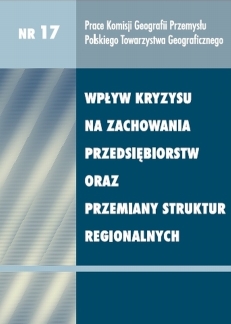A local crisis as a specific part of the global one: the case of Siberia
DOI:
https://doi.org/10.24917/20801653.17.2Keywords:
crisis, SiberiaAbstract
Any global phenomenon manifests itself differently in various countries and regions. Our idea is that for Russia the global crisis can be considered as the third phase of the long-term national socio-economic crisis, and for the important part of Russia, Siberia, even as the fourth phase.These phases are:• First, the crisis of economy, of ideology, of social relationships and of political system stemming from the Soviet times, having brought the crush of the state, some problems of which have been still unsolved;• Second, the crisis of the 90s, born from this crash and economic reforms, including the very crush of the integral country, very painful for common people, poverty, together with social pessimism and passiveness of people who were robbed by the hyperinflation and stagnation of the sectors, such as science and education, that had never been backward in the Soviet times and could perhaps serve as growth points for the new economy, if used and stimulated properly.• Third, specifically Siberian, extensive out-migration and depopulation, in the conditions when state economic policy is influenced by ultra-liberalism denying any state regulation, together with power hyper-centralization, which both tendencies, paradoxically united, lead automatically to concentration of everything in wealthy Moscow.• Fourth, the very global crisis itself
Downloads
Metrics
References
Gaidar, Ye., (2006). Gibel imperii. Moscva: ROSSPAN.
Kolmakov, A. Ye., (2009). The specific features of Russian people behavior in the crisis economy. Road, Region, Market, 57-63.
Hill, F., Gaddy, C.G., (2003). The Siberian Curse. How Communist Planners Left Russia Out in the Cold. Washington, DC: Brooking Institution Press.
Jakobson, A. (2010). Evolution of the city of Irkutsk economic-geographic position in various scales. Prace Komisji Geografii Przemysłu Polskiego Towarzystwa Geograficznego, 16, 9-19.
Downloads
Published
How to Cite
Issue
Section
License
Articles are published under the terms of the Creative Commons License (CC BY-ND 4.0; Attribution– NoDerivs).

